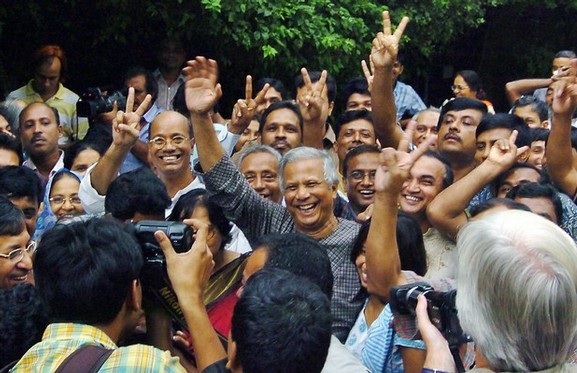
“Jealousy is both reasonable and belongs to reasonable men, while envy is base and belongs to the base, for the one makes himself get good things by jealousy, while the other does not allow his neighbor to have them through envy.”
~Aristotle
by Sabria Chowdhury Balland 20 November 2019
He is perhaps the most celebrated citizen of Bangladesh, winning the Nobel Peace Prize in 2006. In 1983, he founded Grameen Bank, an organization which lanched the innovative practice of providing small loans to rural women in poverty. In 2008, he was rated number two in Foreign Policy Magazine’s list of The Top 100 Global Thinkers. His name is Dr. Muhammad Yunus and his organization, Grameen Bank, became a globally recognized model for microfinance. The organization did not stop there, launching 48 other firms from widely varied sectors such as mobile phones and textiles. There is not a single country which does not honor and respect Dr. Yunus, except one: his home country of Bangladesh.
In 2011, the Bangladesh Prime Minister, Sheikh Hasina’s government ousted Dr. Yunus from his position as the Managing Director of Grameen Bank, announcing that the bank needed to be “reviewed and investigated”. The allegations were based on questions on the effectiveness of microfinancing, stating that essentially, it was nothing more than being a loan shark and the motives were profit-based. Furthermore, there were allegations of coercion, peer pressure and physical harassment of loan defaulters, which were reported about some other microfinance organizations. These allegations were automatically dispersed to Grameen Bank. It had become evident that the government of Bangladesh, in particular, Sheikh Hasina, was exploiting the questions of morality which began to be associated with microfinance in general in order to expel Dr. Yunus.
Because Norway is a 58% stakeholder in Grameenphone, it conducted an investigation and cleared all allegations of any misappropriation of funds by the organization. However, this did not stop the Bangladesh government in launching its crusade against Dr. Yunus and Grameenphone, clearly aimed at defaming and discrediting a citizen of Bangladesh who, in any healthy environment of governance, would be lauded.
Furthermore, there was the case of the World Bank refusing to finance the Padma Bridge on the basis of what it stated was corruption in the highest levels of Sheikh Hasina’s government. In a convoluted move, the Awami League government decided to use the World Bank’s refusal as one influenced by Dr. Yunus. Once again, the allegations were baseless.
The reason behind Sheikh Hasina’s hostilities towards Dr. Yunus date back to 2007. At this time, the Bangladeshi army was backing a caretaker government and a mechanism was launched to get the two bickering begums, Khaleda Zia and Sheikh Hasina out of politics. Both leaders were imprisoned, while the army and the bureaucrats who were at the center of power, chose Dr. Yunus as a refreshing alternative for the leadership of the country. He had an untarnished image and he was respected and admired internationally as a Nobel laureate who had lifted hundreds of thousands of Bangladeshi women out of poverty. This plan eventually fizzled out, but to this day, Sheikh Hasina has clearly not forgotten this incident.
Dr. Yunus’ friendship with Bill and Hillary Clinton also provided a false narrative that all three had a hand in the World Bank’s withdrawal of funding for the Padma Bridge. The delusions did not cease there. It was also alleged by Sheikh Hasina and the Awami League that the Clintons endorsed Dr. Yunus for the Nobel Prize, and miraculously, he received it! Needless to say, Hillary Clinton is also on the “hate list” based on these concoctions.
Time and time and time again, decade after decade, we have been subjected to witness the mischaracterization and vilification of individuals, organizations, opposing political parties and adversaries by the leadership in Bangladesh, without logic, basis and most importantly, ethical grounds. We have seen it with all members of the opposition, main opposition leader Khaleda Zia, former President and freedom fighter, General Ziaur Rahman, former Chief Justice of the Supreme Court SK Sinha, internationally celebrated and respected photographer, Shahidul Alam and most recently with the Bangladeshi cricket team’s captain, Shakib Al Hassan and Dr. Yunus, just to name a few.
This very unfortunate circumstance obviously creates a vacuum in which the future generations of Bangladesh have less and less of a shrinking list of accomplished Bangladeshis to aspire to and idolize. Success based on honest hard work and intellect is somehow transformed into a negative thing because it upsets the temperament of the powers that be. Even a Nobel Prize cannot protect a person from persecution in present day Bangladesh and even a Nobel laureate is treated like a culprit! Granted, Dr. Yunus was very recently granted bail after an arrest warrant had been issued against him, giving the ruling party and its leadership its much desired self-proclaimed image of being champions of humanitarianism.
Even if the majority of Bangladeshis bought into the narratives of defamation against Dr. Yunus or anyone else with a similar misfortune, (and this is most certainly not the case), to quote Sidhhartha Gautama Buddha, “Three things cannot be long hidden: the sun, the moon and the truth.”
